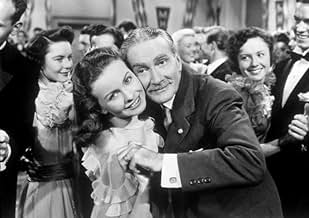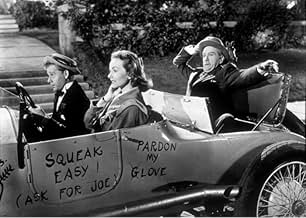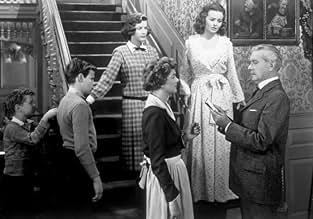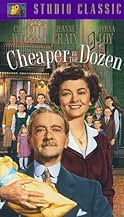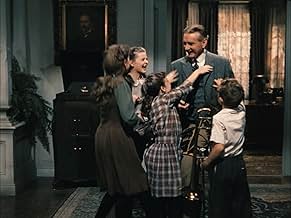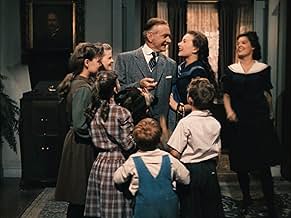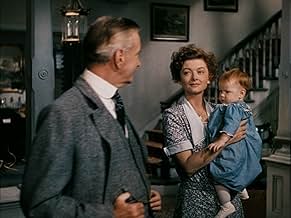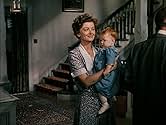Myrna Loy interpreta a la esposa del quisquilloso padre de sus 12 hijos, que tiene métodos únicos y humorísticos para hacer frente a las terribles experiencias a las que sin duda se enfrenta... Leer todoMyrna Loy interpreta a la esposa del quisquilloso padre de sus 12 hijos, que tiene métodos únicos y humorísticos para hacer frente a las terribles experiencias a las que sin duda se enfrenta una familia tan difícil de manejar.Myrna Loy interpreta a la esposa del quisquilloso padre de sus 12 hijos, que tiene métodos únicos y humorísticos para hacer frente a las terribles experiencias a las que sin duda se enfrenta una familia tan difícil de manejar.
- Dirección
- Guionistas
- Elenco
- Premios
- 2 premios ganados y 1 nominación en total
- Jim Bracken
- (sin créditos)
- Mary Gilbreth
- (sin créditos)
- Joe Scales
- (sin créditos)
- Teacher
- (sin créditos)
- Martha Gilbreth
- (sin créditos)
- Mrs. Benson
- (sin créditos)
- Jed - Delivers Telegram
- (sin créditos)
- Jane - Age 1
- (sin créditos)
- Dirección
- Guionistas
- Todo el elenco y el equipo
- Producción, taquilla y más en IMDbPro
Opiniones destacadas
A film such as this allows us to stop being spoon-fed, and lets us pick and choose what we want from the story, from the film.
It is amusing to me that most of the posts against this fine film appear to be posted while watching the film through 2004-style glasses. It isn't a pretty thing, but women weren't held in the same position that they are today - and the film portrayed this wonderfully. Did it make the wife in the film any less admirable? I think it showed the inner strength that women had to have, making a remarkable statement about women of the era - that even though they might not be able to be out in the forefront - they had every bit as much (if not more) strength then the men. Even the father couldn't handle all the children - but the mother could -WHILE having a profession to boot!!
While the father wasn't necessarily warm, and you didn't get that fuzzy feeling modern movies give us - I believe the character was very true to life when put in the context of the 1920s. I have spoken a great deal with many people I know, that had lived through that time period. I can tell you now, that many people in the early 1900s never experienced the type of love and closeness we feel today. Survival wasn't a near-guarantee back then, and harshness, crassness, and distance from others was more common. Children died at an alarming rate . . . adults too.
History is what it is - and it is NOT subject to change, regardless of the nature of today's political attempts. Slavery happened, women weren't seen as equals, people were lynched by mobs of overzealous citizens, people starved, the dust bowl occurred. None of these events are wonderful, but they are our history, and there should be no shame in discussing - or accurately portraying / conveying these topics. I think this film is what it is too - a look at the life of an average family (perhaps an above average number of children - but even that wasn't all that rare).
Enjoy this film - but please, be prepared to leave your glasses smudged with 2004 politics and standards behind - this is a treasure where we can get a glimpse of the type of characters that lived with our grand parents, great grand parents, and the like. If you like to be spoon-fed, please DON'T watch this movie.
Still, there is something of a socially conservative subtext behind the scattered goings-on. Importantly, it's one that doesn't harm the generally humorous results. Take the way the family-planning lady (Natwick) is gently mocked when Dad parades his army of offspring before her. This was, after all, back in the day when contestants on quiz shows with bigger families got bigger applause. Or take the prom scene where young Tom (Hill) pointedly affirms to teen-age Ann (Crain) what her dad has already explained to her—namely, that boys only marry "good girls". This scene, however, appears aimed specifically at the audience and is a bit awkward for such an otherwise smooth production.
Despite the one scene, this is not an in-your-face subtext, but it is present and quite consonant with the times. After all, idealized families were not unusual for either movies or TV of the 50's, unlike today's often ribald variety. However, I am curious how in such a sunny movie the unexpectedly dark development suddenly occurs near the end. I guess its inclusion was to maintain the facts of the real life family on which the movie is based. At the same time, the development prevents things from getting too sentimental, always a pitfall for movies like this. Nonetheless, it is understandably passed over quickly and at a distance.
All in all, the movie remains warmly amusing, thanks mainly to another of Webb's prickly but likable characters. Then too, the kids are cute without being cutesy; at the same time, the lovely Crain looks a little long in the tooth to be playing a teenager. However, I'm still wondering how Mom can bear all of twelve kids and still look like Myrna Loy. Oh well, just another of Hollywood's enduring mysteries.
¿Sabías que…?
- TriviaIn the factual Gilbreth family, daughter Mary died from a childhood illness; the movie includes a Mary, but keeps her in the background with no lines.
- ErroresNear the end of the film when Frank Sr. is getting in his car to head for Europe, he tosses his hat on the seat with his coat on top of it. After saying goodbye to his family, he gets into the car and the hat is on top of the coat.
- Citas
Mailman: All those kids yours?
Frank Gilbreth: Oh, these aren't so many. You ought to see the ones we left behind.
Mailman: How you ever feed 'em?
Frank Gilbreth: Oh, they come cheaper by the dozen.
- Créditos curiososOpening credits prologue: This is the true story of an American family.
- ConexionesFeatured in Jack the Bear (1993)
Selecciones populares
- How long is Cheaper by the Dozen?Con tecnología de Alexa
Detalles
Taquilla
- Total en EE. UU. y Canadá
- USD 9,646,500
- Tiempo de ejecución1 hora 26 minutos
- Relación de aspecto
- 1.33 : 1
Contribuir a esta página



